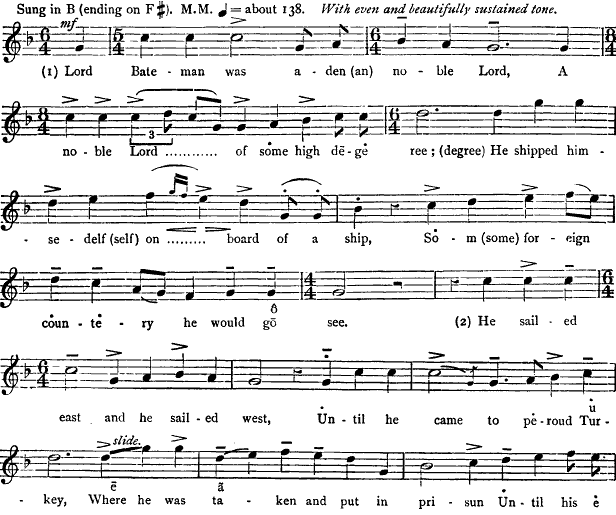Lord Bateman- Taylor (Lincolnshire) 1906 Grainger
[Songs Collected by Percy Grainger]
by Lucy E. Broadwood, Percy Grainger, Cecil J. Sharp, Ralph Vaughan Williams, FrankKidson, J. A. Fuller-Maitland, A. G. Gilchrist
Journal of the Folk-Song Society, Vol. 3, No. 12 (May, 1908), pp. 170-242
10. -LORD BATEMAN
SUNG BY MR. JOSEPH TAYLOR,
Phonographed and noted by Percy Grainger. AT BRIGG, LINCOLNSHIRE, JULY 28TH, 1906.

(1) Lord Bateman was a noble Lord,
A noble Lord of some high degree.
He shipped himself on board of a ship,
Some foreign countery he would go see.
(2) He sail - ed east and he sail - ed west,
Until he came to peroud Turkey
Where he was ta ken and put in prisun
Until his life it grew quite weary.
(3) And in this prisun there grew a tree,
It grew so large, and it grew so strong;
Where he was chained around the middle
Until his life it was almost gone.
(4) His jailor 'ad but one only daughter,
The fairest creature my two eyes did see;
She stole the keys of her father's prisun,
And said Lord Bateman she would set free.
The pauses preceding verses two and three are of uniform length. I have noted but three well-remembered versions of "Lord Bateman." In these three I have noticed that the first quarter of the verse beginning: "His jailor had but one only daughter" [verse four of the above] is in each case sung to a melodic phrase more or less closely resembling that which accompanies these words in the above version.
Thus a version of " Lord Bateman" sung to me by Mr. Joseph Leaning (of Bartonon-Huiiber, North Lincolnshire), opens its second verse as follows:

(2) Then this jailer had but one daughter; while all his other six verses start on the following lines:

Mr. Wray's singing of these particular words (see No. 11, verse four) also tallies fairly closely with the beginning of Mr. Taylor's fourth verse; in any case his treatment of the word " daughter" is identical with that of the two other versions, and the general trend of the whole quarter verse in the three versions is much the same. It thus seems that there may be some special tradition bearing upon this particular spot in the ballad. It would be interesting to know if other collectors have noticed a similar treatment of this particular quarter verse.
Can the name of "Bateman" have any connection with the name "Baadsmand," "Batsman" (meaning boat's-man), so familiar in Scandinavian folk-ballads? I cannot recollect any ballads about "liden Baadsmand" having a plot at all akin to that of our "Lord Bateman."-P. G.
Child, who deals exhaustively with the ballad of "Lord Bateman" under the head of "Young Beichan" (in English and Scottish Ballads), states that Scandinavian, Italian and Spanish ballads preserve a story essentially the same. The names "Her Peder den Rige" and "Ellensborg" (Ellen) are found in nearly all the Scandinavian versions. For other tunes see "The Loving Ballad of Lord Bateman," illustrated by Cruikshank, I839 (Cruikshank learnt his tune from a street singer); also Sussex Songs, Christie's Traditional Ballad Airs ("Lord Beichan"), Northumbrian Minstrelsy, Songs of Northern England, Shropshire Folk-Lore, Traditional
Tunes, English County Songs, Child's Ballads (see above) and Folk-Song Journal, Vol. i, No. 5, p. 240.- L. E. B.
The ornamental figure at the beginning of the penultimate bar of this song is identical with the first four notes of the fourth bar of the preceding song, " Geordie" (No. 9), and may be a personal peculiarity of Mr. Taylor's. Note also the three notes to the words " creature may" in the last verse of this song, the first three notes of the second bar of " Geordie," and again, the first three notes of the penultimate bar of "lThe White Hare" (No. 8). I have elsewhere called attention to this very characteristic use of the passing note in folk-airs. When the folk-singer wishes to connect a note with its fourth below, he will usually employ the note which is nearest to the one that he is singing and which, therefore, he has clearest in mind. But, as a general rule, he will keep in his scale and take the nearest diatonic note. Now, in all three of these cases, Mr. Taylor sang the chromatic note. Indeed, in this song and in " Geordie " these are the only occasions in which he employs a chromatic note at all. Is this also an individual peculiarity?- C. J. S.